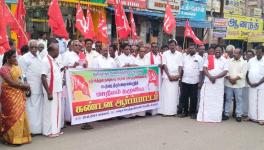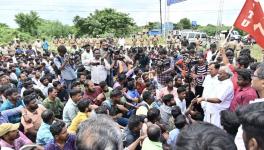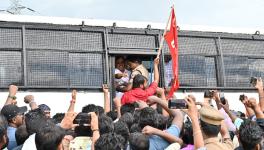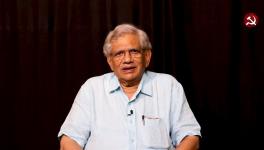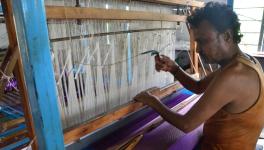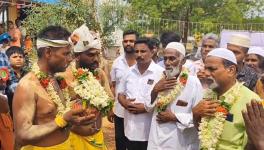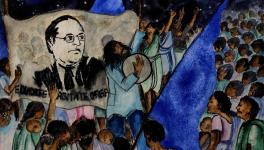Lives of Peasants in India #4
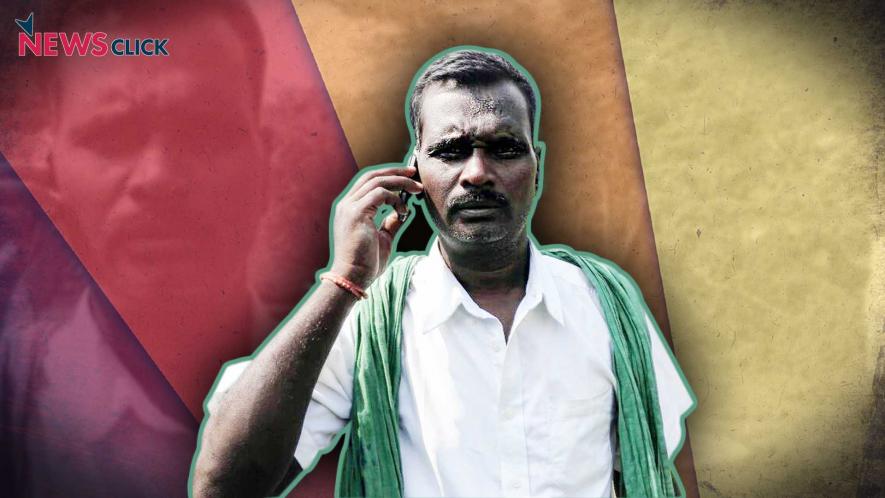
Newsclick Image by Nitesh Kumar
The year 2017 saw an outpouring of farmers’ protests sweeping the country. To understand why they happened, NewsClick presents a series of profiles of farmers from different parts of India, based on interviews done by students from Delhi, guided by the Society for Social & Economic Research (SSER). See Introduction to series.
During the Kisan Mukti Sansad held on 20-21 November in Delhi, we interviewed Aandavar, a paddy farmer from Karaiyevetti village, Ariyalur district in Tamil Nadu, to delve deeper into the impact of recurrent droughts on his household.
Aandavar is 46-years old. Although he has done a Diploma in Communication Engineering, he has never been able to find a job as an engineer. Cultivating five acres of household land and looking after cattle is his main occupation. Aandavar's household is a joint-family comprising nine members. He has two brothers: Manivannan, who is employed as a forest watcher at the Karaivetti Bird Sanctuary, and Sundaran, who occasionally works as a caterer. Aandavar is a widower and has two children, both of whom are studying in school. Aandavar, his mother Govindammal and his sister-in-law Poomaala regularly work on their land. His brothers also work in the fields occasionally.
Ariyalur district is located in the Cauvery delta, in the foothills of the Eastern Ghats. Majority of the district's population is engaged in agriculture and related activities. As per the 2014-15 crop statistics of the district, paddy accounts for 20 per cent of the district's gross cropped area. Other major crops include cashews, cotton, maize, sugarcane, pulses and groundnut. Ariyalur farmers depend on canals, tanks and their own tubewells for irrigation.
Karaiyavetti village, from where Aandavar hails, is located about 35 km from Ariyalur district headquarters. According to the 2011 Census, Karaiyavetti with 793 households had a total population of 3051, out of which 1248 were cultivators and 496 were agricultural workers. Agriculture in Karaiyavetti is mainly based on irrigation from the Karaivetti Tank, which is one of the largest irrigation tanks of Tamil Nadu. The Tank is fed by the Pullambadi canal during the northeast monsoon (October-December) and also receives water from the Mettur dam in Salem.
Navarai (January to April) is the main agricultural season in Karaiyavetti during which a 120 day crop of paddy is grown. During the season, the land preparation and sowing is done using tractor and hired labour. After that, labour is hired for harvesting, threshing and transporting grain to the market. All other tasks were done by members of the household themselves. In the last Navarai season, hired male workers were paid Rs. 600 per day. In contrast, the wages of female workers were only Rs. 300 per day.
For rest of the year, i.e. for over 200 days, the land remains fallow. Sometimes, depending on the availability of water, they also grow sorghum after the paddy harvest. Low rainfall has been a problem in Tamil Nadu for last two years, with 2016 recording the lowest ever rainfall in the last 140 years.
A group of farmers from Tamil Nadu, spearheaded by National South Indian River’s Interlinking Farmer’s Association (NSIRIFA), have been on an indefinite protest in Delhi since June this year. Their list of demands include a Rs. 40,000 crore drought relief package for Tamil Nadu, waiver of farm loans, setting up of Cauvery River Management Board, crop insurance for all farmers and remunerative prices for their produce.
On account of lack of water, for the last two years, Aandavar's household has had to leave the land fallow after Navarai. In 2015, the family produced 120 quintals of paddy in Navarai, out of which they kept 30 quintals for household consumption and sold the rest to Tamil Nadu Civil Supplies Corporation (TNCSC) at Rs.1420 per quintal. Out of the 175 quintals of paddy straw produced, 105 quintals were earmarked for animal fodder and the rest was sold locally at Rs.143 per quintal. On the whole, Aandavar's household was able to earn a net income of about Rs.1.25 lakhs from paddy cultivation that year.
The household also had 5 cows and 3 buffaloes, and the milk produced by them was an important source of income during the lean seasons. However, recurrent droughts made fodder scarce. As maintaining cattle became uneconomical, and the household was unable to make its ends meet, they were forced to sell their cattle.
Aandavar and his family are drowning in debt and last year's drought has worsened their situation. In 2015, they mortgaged jewellery to a cooperative society and took a loan of Rs. 1.35 lakh at 1 per cent per month interest. This was on top of an agricultural loan of Rs.2.50 lakh at 7% per annum given by the Tamil Nadu government in 2010. In 2017, they took another loan of Rs.1.25 lakh to meet their consumption expenses. They have already sold 2 acres of farmland in the last 7 years to pay off the loans partially. With rising daily consumption expenses, along with the education expenses of the 4 school-going children in the family, loan repayment has become almost impossible.
Aandavar feared that he will have to sell all his land unless he got some relief from the government. He added that irrigation will be possible only if the Cauvery river water dispute is resolved with some reasonable degree of water supply to downstream areas.
“If the government does not provide us with better crop prices and effective crop insurance, many more farmers in my village may be forced to commit suicide,” he said.
M.S. Raunaq is a Research Scholar at the Jawaharlal Nehru University and Shreshtha Saraswat is Research Fellow at the Society for Social and Economic Research
Part 1 of the series can be read here.
Part 2 of the series can be read here.
Part 3 of the series can be read here
Get the latest reports & analysis with people's perspective on Protests, movements & deep analytical videos, discussions of the current affairs in your Telegram app. Subscribe to NewsClick's Telegram channel & get Real-Time updates on stories, as they get published on our website.










